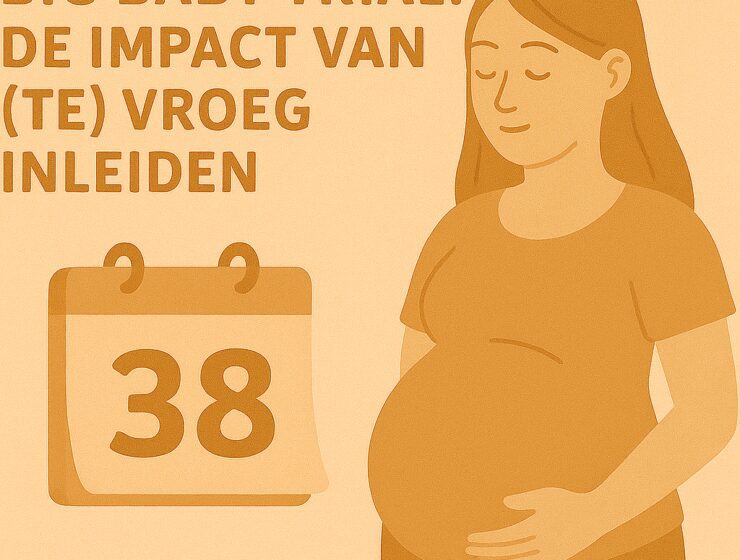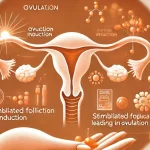When you're pregnant, it sometimes seems like your body has a life of its own. Topics like pooping during your pregnancy (and delivery) may not be the "first thing" you like to talk about, even with your healthcare provider, but rest assured: you are certainly not the only one thinking about this. At Midwives Lelystad we understand that you may prefer to search online for answers rather than ask these intimate questions. That's why we've decided to cover all the ins and outs – from constipation and diarrhea to hemorrhoids – regarding this delicate subject. We keep it informal because no one needs medical jargon when it comes to something as human as going to the toilet. So, let's dive into the world of pooping during pregnancy: everything you might rather google than ask your midwife, but with honest information from practice.
Pregnancy and constipation: why it happens and what you can do about it
Many expectant mothers experience constipation during their pregnancy. This is because the hormone progesterone, which is present in high levels during pregnancy, makes the intestines lazy. This makes them move less efficiently and can lead to constipation. Moreover, as the pregnancy progresses, the space in your abdomen decreases, increasing the pressure on your intestines. But don't panic, there are plenty of things you can do to ease the suffering.
You can start with the following:
-
- Eat fiber-rich foods: Vegetables, fruit and whole grain products can work wonders.
-
- Stay hydrated: Drink plenty of water during the day to promote bowel movements.
-
- Light movement: A short walk can already help to get the intestines moving.
In addition, if necessary, you can consult with us as your midwife or GP about the safe use of fiber bags that are appropriate during pregnancy. It is important that you always do this in consultation, because not every drug is suitable or safe during this special period. Don't forget that these complaints are often temporary and usually disappear after delivery. Patience and tips are the key words during this period.
The downside: diarrhea during pregnancy
Experiencing diarrhea during pregnancy can be just as unpleasant as constipation. The cause varies from hormonal changes to the new pressure of your growing baby on your intestines. Some women also find that their diet or prenatal vitamins contribute to this uncomfortable problem. It's crucial to stay hydrated, especially if you're experiencing diarrhea, as your body needs more fluids than normal during this phase.
Here are a few tips to help you:
-
- Stay hydrated: Drink plenty of water and electrolyte solutions to replenish lost fluids.
-
- Adjustments in your diet: Avoid foods that can aggravate diarrhea, such as fatty or highly spicy foods. Instead, focus on easily digestible meals.
-
- Probiotics: Consider adding probiotics to your diet. These can help support the good bacteria in your gut and improve digestion.
It's always a good idea to talk to us as your midwife if you have any concerns about diarrhea during your pregnancy. Sometimes it can be a sign of something that needs more attention. But often it is a temporary obstacle that can be managed with the right care and adjustments.
Hemorrhoids: a painful truth of being pregnant
Many expectant mothers experience them at one time or another during their pregnancy: hemorrhoids. This uncomfortable, sometimes even painful problem is pretty much the last thing you want to worry about, but unfortunately it is a reality for many. The increased pressure of the growing uterus on the pelvic floor, combined with pregnancy hormones that cause the blood vessels to expand, makes these annoying friends appear a little more often. Plus, when constipation becomes a daily struggle (thanks, iron supplements), the chance of hemorrhoids only increases.
Dealing with Hemorrhoids:
-
- Avoid Constipation: A high fiber intake, drinking enough water and regular exercise can help prevent constipation and thereby reducethe pressure on the hemorrhoids.
-
- Gentle Care: Use soft, non-alcoholic wet wipes or rinse with water after using the toiletto minimize irritation.
-
- Cold Compress: Applying a cold compress to the hemorrhoids can provide immediate relief and reduce swelling.
-
- A warm bond: Warm sitz baths (a shallow warm bath in which you sit with your lower body) several times a day for approximately 10 to 15 minutes can provide relief.
If despite these preventive measures and relief techniques you are still experiencing discomfort, do not hesitate to contact us as your midwife. Many women experience shame around this topic, but we are here to help you. support and advise you every step of the way. We can give advice on more effective treatments or refer you to a specialist if necessary. Remember: you are certainly not the only one going through this and there is always help available to minimize the discomfort.
Tips and tricks to keep your intestines happy during pregnancy
During your pregnancy, your digestion can sometimes let you down. Don't worry, this is completely normal and can range from constipation to those pesky hemorrhoids. But how do you stay best friends with your intestines during these special times? First and foremost, hydration is your best friend. Make sure you drink enough water; around two liters per day is a good guideline. You can also fiber-rich food such as fruit, vegetables and whole grain products do wonders for your bowel movements.
In addition to a healthy and balanced diet light exercise such as walking or swimming will help keep your intestines active. It doesn't have to be a marathon, but little bits of exercise can make a big difference. Moreover, try not to ignore the urge to go to the toilet. When your body tells you it's time, listen! Below is a short list of foods that are particularly intestinally friendly during your pregnancy:
-
- Prunes – natural laxative.
-
- Oatmeal – rich in fiber and perfect for breakfast.
-
- Yogurt – ensures a more pleasant digestion.
-
- Water – maintain your hydration.
Remember, if you continue to experience problems with your digestion despite these tips, it is important to discuss this with us or your doctor. They can possibly refer you to a dietician for tailor-made advice or suggest other solutions to help you through this time. After all, every body is different and what works for one person may not work for another.
When should you worry about your bowel movements during pregnancy?
There are some clear signs that it is time to pay attention to changes in your bowel movements during pregnancy. Constipation is a common complaint caused by hormonal changes and the pressure of the growing uterus on the intestines. It is normal to experience this occasionally, but if you notice that you regularly have difficulty going to the toilet, this may indicate a need for adjustment in your diet or lifestyle. Diarrhea, on the other hand, can also occur and although less common, it is just as important to monitor this. Sudden changes in the frequency, consistency, or color of your stool could be signs that something isn't quite right.
Hemorrhoids are another unpleasant side of pregnancy that no one likes to talk about but still occurs often. These swollen veins in your rectum can be quite painful, especially during and after going to the toilet. Although hemorrhoids usually subside after delivery, it is important to treat them in the meantime to minimize discomfort. Note: if you blood If you notice any stools in your body, it is important to discuss this immediately with your GP. Below is a short checklist to keep an eye on your bowel movements during pregnancy:
| What to observe | When to worry |
|---|---|
| Stool consistency | Hard, dry or watery for more than a few days |
| Frequency of going to the toilet | Less than 3 times a week or sudden increase |
| Color of the stool | Black, red or white for no apparent nutritional reason |
| Pain or discomfort | Consistent or increasing pain, especially during bowel movements |
Remember that everyone's body is different and one pregnant woman may experience very different symptoms than another. But it's always better to be on the safe side and share your findings with your healthcare provider. They are there to help you and can provide advice that is specifically tailored to your situation. This way you not only stay healthy, but also reassured during your pregnancy.
Resume
And that concludes our candid conversation about a topic that can sometimes feel a little awkward — but is extremely important to talk about during your pregnancy. So whether you're struggling with constipation, dealing with diarrhea, struggling with hemorrhoids, or just have questions about "number two" in a time when your body is going through so many changes, know that you are not alone.
At Midwives Lelystad we understand that these issues can have an impact on your daily life and we want to reassure you that we are here, ready to listen and provide support. Remember that no question is too embarrassing and we can work together on solutions that increase your comfort during your pregnancy.
Take care of yourself and don't hesitate to contact us for advice or help. We're just a phone call or visit away—because your well-being and that of your little one are our top priority.








